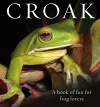
Croak
Phil Bishop - Hardback
£12.99
Phil Bishop was born and brought up in Devon, UK, where his keen interest in amphibians began. What followed was a lifetime of achievements in conservation and in highlighting the ground-breaking importance of the humble frog. Searching for more species of amphibian, Phil travelled the world to places including South Africa, where he discovered and named a new species of frog, Arthroleptella ngongoniensis. Phil’s extensive experience in the study of frogs inspired him to compile the collection of frog-related quotes that is Croak. Phil was a Professor of Zoology at the University of Otago, the Co-Chair of the IUCN Species Survival Commission Amphibian Specialist Group, and the Chief Scientist of the Amphibian Survival Alliance. In these positions, he helped to coordinate international amphibian conservation in response to the global Amphibian Conservation Action Plan. His team of students and post-docs (and often sabbatical visitors) mainly concentrated on the conservation of New Zealand frogs as they are some of the least well known frogs in the World, even within New Zealand. His lab group worked on improving methods for frog translocations, discovering new and interesting aspects of basic frog biology, amphibian diseases, monitoring endangered frog populations, and improving environmental education. Phil has been widely published, with three previous books about frogs, several book chapters, and over 100 ground-breaking scientific papers. He was an editor of FrogLog, the world’s most popular online amphibian conservation magazine. Phil won many awards for his teaching and conservation efforts, including the University of Otago Lifetime Achievement Award 2018 and the National Conservationist of the Year Award 2018 by Auckland Zoological Park Recognising Excellence. Phil’s passing early in 2021 is a loss keenly felt by the international scientific community. This book now serves as a tribute to a life spent at the forefront of conservation as he sought to deepen our understanding of these vitally important creatures.